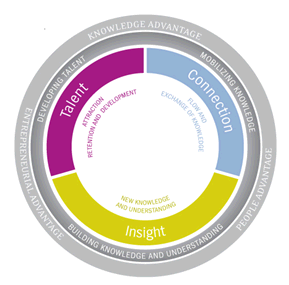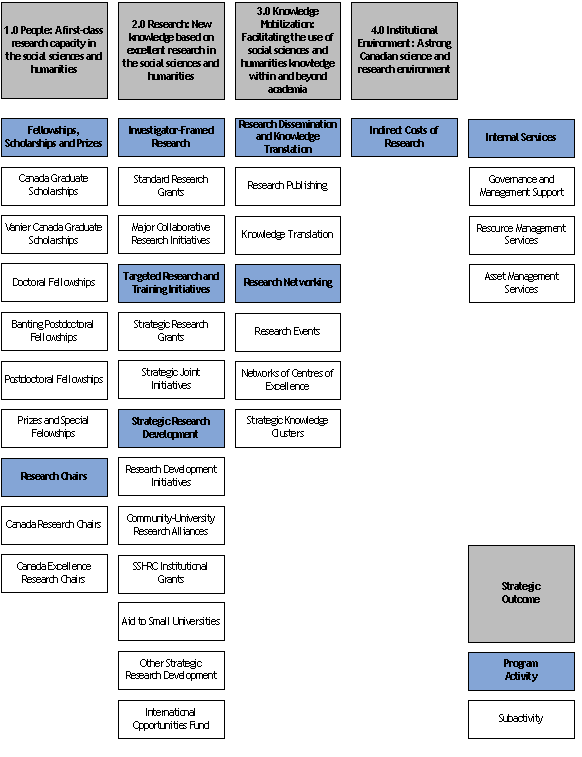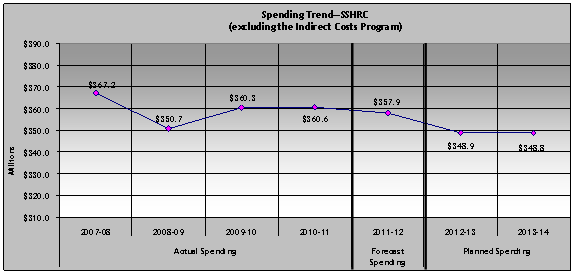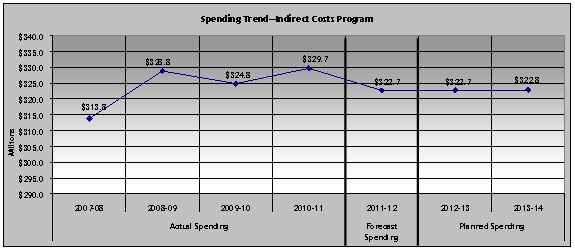Common menu bar links
Breadcrumb Trail
ARCHIVED - Social Sciences and Humanities Research Council - Report
 This page has been archived.
This page has been archived.
Archived Content
Information identified as archived on the Web is for reference, research or recordkeeping purposes. It has not been altered or updated after the date of archiving. Web pages that are archived on the Web are not subject to the Government of Canada Web Standards. As per the Communications Policy of the Government of Canada, you can request alternate formats on the "Contact Us" page.
MINISTER’S MESSAGE
As Canada's economy shows continued signs of growth following the global recession, the Harper Government has a clear vision for Canada. We remain focused on creating jobs and economic growth in all regions of Canada. We remain committed to fighting protectionism, the number one impediment to global economic recovery. And we will continue to support science and technology as it drives innovation to improve quality of life for Canadians.
In the coming year, Industry Canada and its Portfolio partners will seize the opportunities of the evolving global economy. We will set the conditions for industrial success by improving the policy we put in place, making strategic investments, and supporting business-focused programs and services. We are working to remove impediments to competition, and to create the best climate for international investment. Industry Canada will lead efforts in developing major policy initiatives to support Canada’s digital economy, and shape a whole-of-government strategy for federal tourism activities. The Department will also improve the cost-effectiveness and efficiency of its own operations, and work with recovering industries and sectors to help assure a solid and prosperous future.
In 2011-12, the Social Sciences and Humanities Research Council of Canada (SSHRC) will continue to help build a stronger, more prosperous and innovative Canadian economy and society, through its support for research and training in the social sciences and humanities. SSHRC will support students through scholarships, fellowships and training opportunities, and directly contribute to the development of a highly educated, skilled, and flexible Canadian workforce. SSHRC will continue to build on its investments in areas of importance to Canadians, including the digital economy, management, business and finance, the environment, and northern communities.
And, as always, I will work with the Industry Portfolio partners, the private sector and other governments to create the fundamentals for a strong and competitive economy.
It is my pleasure to present this year’s Report on Plans and Priorities for the Social Sciences and Humanities Research Council of Canada.
Christian Paradis
Minister of Industry
and Minister of State (Agriculture)
MINISTER OF STATE’S MESSAGE
 As Minister of State for Science and Technology, it is my pleasure to present this year’s Report on Plans and Priorities for the Social Sciences and Humanities Research Council of Canada.
As Minister of State for Science and Technology, it is my pleasure to present this year’s Report on Plans and Priorities for the Social Sciences and Humanities Research Council of Canada.
The economy remains our government’s top priority. As Canada is still recovering from the global recession, we are focused on creating jobs and economic growth.
This is why we are supporting promising new research as part of Canada’s Economic Action Plan: to create jobs, strengthen our economy and improve Canadians’ quality of life.
Science is key to Canada’s future economic growth. To remain at the forefront of the global economy, we must invest in the people and ideas that will produce tomorrow’s breakthroughs.
Our investments through the Social Sciences and Humanities Research Council are helping Canada develop, attract and retain the world’s best and brightest researchers. As a result, our country is strengthening its position as a leading destination for the world’s top research talent.
In the four years since Prime Minister Harper launched the Government of Canada’s science and technology strategy, we have achieved a great deal, for which we as Canadians can be proud.
From Iqaluit in the Far North to rural Saskatchewan, from Victoria to St. John’s, and from Quebec’s Eastern Townships to Northern Ontario, there are thousands of researchers pursuing some of the most important questions of our time—all with the support and encouragement of the Government of Canada. Indeed, it is through grants from the Social Sciences and Humanities Research Council that these Canadian researchers remain on the leading edge of research and innovation. This past year, the Council has supported research that explored such diverse issues as management practices in the service sector, school and community partnerships in rural areas, the well-being of military families, and the effects of technological change on productivity.
Through its new funding opportunities, the Social Sciences and Humanities Research Council will strengthen opportunities for partnerships between the academic, public, private and not-for-profit sectors to develop practical solutions to complex problems. The Council will also promote and support the flow and exchange of research knowledge across academia and society as a whole, so that Canadians may enjoy the intellectual, cultural, social and economic benefits of social sciences and humanities research.
This important work requires the ongoing engagement and support of our many stakeholders in order to realize its full potential. As we move into 2011–12, I will continue to work with our university partners, the private sector and Canadians across the country to achieve the priorities laid out in this report.
Gary Goodyear
Minister of State (Science and Technology)
Section I - DEPARTMENTAL OVERVIEW
Raison d’être
The Social Sciences and Humanities Research Council (SSHRC) funds research and research training that builds knowledge about people, past and present, with a view toward creating a better future. From questions of family and culture to concerns about jobs and employment, research about people—how we live, what we think and how we act—informs new knowledge and insights on the issues that matter most to Canadians.
SSHRC-funded research and research training play a unique role within Canada’s science, technology and innovation system, and is key to meeting Canada’s productivity agenda. Social sciences and humanities research fosters the development of the creative and analytical skills needed to respond to the complex emerging challenges of critical importance to Canadians. To this end, SSHRC’s strategic outcomes focus on people, research, knowledge mobilization, and the institutional environment. These outcomes help advance Canada’s advantages, as outlined in the federal science and technology (S&T) strategy, Mobilizing Science and Technology to Canada’s Advantage, as follows:
- People—creating a first-class research capacity in the social sciences and humanities to build a People Advantage;
- Research excellence—creating new knowledge to heighten Canada’s Knowledge Advantage;
- Knowledge mobilization—facilitating the use of research to contribute to Canada’s Entrepreneurial Advantage; and
- The institutional environment—providing Canada with a strong setting for science and research, and helping it achieve world-class excellence.
SSHRC actively contributes to the S&T strategy’s priority areas by supporting research and training related to a variety of key areas, including environmental science and technologies, finance and business, and new media and communications. The results of these and other investments are used by SSHRC-supported experts, in collaboration with key stakeholders from the private, public and not-for-profit sectors, to translate knowledge into new solutions and productive applications.
SSHRC will continue to build on its successes in supporting the federal S&T strategy, through its ambitions of quality, connections, and impact, as described in its strategic plan, Framing Our Direction 2010-12. Moving forward, SSHRC will pursue these ambitions through three new umbrella programs—Talent , Insight andConnection —thereby creating a simpler structure for funding social sciences and humanities research excellence on issues of importance to Canadians.

Responsibilities
SSHRC is an agency that reports to Parliament through the Minister of Industry. It was created through an act of Parliament in 1977 and mandated to:
- promote and assist research and scholarship in the social sciences and humanities; and
- advise the Minister in respect of such matters relating to such research as the Minister may refer to the Council for its consideration.
To fulfill its mandate, SSHRC offers programs that provide Canadian researchers and students with grants, scholarships and fellowships, respecting the terms of the federal Policy on Transfer Payments. SSHRC is also responsible for administering the following tri-agency programs, offered jointly with the Natural Sciences and Engineering Research Council (NSERC) and the Canadian Institutes of Health Research (CIHR):
- the Canada Research Chairs Program;
- the Canada Excellence Research Chairs Program; and
- the Indirect Costs Program.
In addition, SSHRC works with Industry Canada, as well as with NSERC and CIHR, to support Networks of Centres of Excellence initiatives. It also collaborates with NSERC and CIHR to deliver the Canada Graduate Scholarships, Vanier Canada Graduate Scholarships, and Banting Postdoctoral Fellowships programs. SSHRC will continue to foster this collaboration to the benefit of all Canadians by building on the harmonization of tri-agency programs, practices and policies. In recent years, SSHRC, along with NSERC and CIHR, has also been working to increase connections across the tri-agencies through monthly meetings of the agencies’ presidents and senior executives.
SSHRC is governed by a council appointed by an order-in-council to reflect the perspectives of the academic, public and private sectors. SSHRC’s governing council promotes and assists research and scholarship in the social sciences and humanities. It meets regularly to set strategic policy and program priorities, allocate budgets, and advise the Minister of Industry and Parliament on research policy in these areas.
Strategic Outcomes and Program Activity Architecture for 2011-12

Program Activity Architecture Crosswalk
SSHRC obtained approval from Treasury Board in June 2010 to create a new program subactivity to reflect the Government of Canada’s Budget 2010 announcement of the new, prestigious Banting Postdoctoral Fellowships program, and to reflect the planned sunsetting of another program subactivity, the Social Economy Suite.
| Subactivity 2011-12 | Subactivity 2010-11 (former) |
|---|---|
| N/A | 2.2.3 Social Economy Suite |
| 1.1.4 Banting Postdoctoral Fellowships Program | N/A |
Planning Summary
| 2011-12 | 2012-13 | 2013-14 |
|---|---|---|
| 680.6 | 671.6 | 671.6 |
| 2011-12 | 2012-13 | 2013-14 |
|---|---|---|
| 208 | 200 | 200 |
Planning Summary Tables
| Program Activity | Forecast Spending 2010–11 ($ millions) |
Planned Spending ($ millions) | Alignment to Government of Canada Outcomes | ||
|---|---|---|---|---|---|
| 2011–12 | 2012–13 | 2013–14 | |||
| 1.1 Fellowships, Scholarships and Prizes | 120.1 | 120.4 | 116.9 | 117.0 | An innovative and knowledge-based economy |
| 1.2 Research Chairs | 61.0 | 61.0 | 61.0 | 60.9 | An innovative and knowledge-based economy |
| Total Planned Spending | 181.4 | 177.9 | 177.9 | ||
| Program Activity | Forecast Spending 2010–11 ($ millions) |
Planned Spending ($ millions) | Alignment to Government of Canada Outcomes | ||
|---|---|---|---|---|---|
| 2011–12 | 2012–13 | 2013–14 | |||
| 2.1 Investigator-Framed Research | 82.1 | 87.5 | 87.2 | 87.1 | An innovative and knowledge-based economy |
| 2.2 Targeted Research and Training Initiatives | 20.0 | 9.7 | 9.2 | 9.2 | An innovative and knowledge-based economy |
| 2.3 Strategic Research Development | 29.3 | 31.0 | 30.8 | 30.8 | An innovative and knowledge-based economy |
| Total Planned Spending | 128.2 | 127.2 | 127.1 | ||
| Program Activity | Forecast Spending 2010–11 ($ millions) |
Planned Spending ($ millions) | Alignment to Government of Canada Outcomes | ||
|---|---|---|---|---|---|
| 2011–12 | 2012–13 | 2013–14 | |||
| 3.1 Research Dissemination and Knowledge Translation | 7.2 | 7.6 | 7.6 | 7.6 | An innovative and knowledge-based economy |
| 3.2 Research Networking | 23.4 | 24.3 | 19.8 | 19.8 | An innovative and knowledge-based economy |
| Total Planned Spending | 31.9 | 27.4 | 27.4 | ||
| Program Activity | Forecast Spending 2010–11 ($ millions) |
Planned Spending ($ millions) | Alignment to Government of Canada Outcomes | ||
|---|---|---|---|---|---|
| 2011–12 | 2012–13 | 2013–14 | |||
| 4.1 Indirect Costs of Research | 329.7 | 322.7 | 322.7 | 322.8 | An innovative and knowledge-based economy |
| Total Planned Spending | 322.7 | 322.7 | 322.8 | ||
| Internal Services | Forecast Spending 2010-11 ($ millions) |
Planned Spending ($ millions) | ||
|---|---|---|---|---|
| 2011-12 | 2012-13 | 2013-14 | ||
| Internal Services | 17.6 | 16.4 | 16.4 | 16.4 |
| Total Planned Spending | 16.4 | 16.4 | 16.4 | |
Contribution of Priorities to Strategic Outcomes
| Operational Priority | Type | Links to Strategic Outcomes (SOs) | Description |
|---|---|---|---|
|
Strengthen SSHRC programs and policies aimed at developing the next generation |
New |
SO 1.0 |
Why is this a priority? Talented, skilled, creative people are at the heart of successful societies. Demand is growing across the private, public and not-for-profit sectors for highly qualified personnel who are creative, analytical and articulate, as well as sophisticated in their understanding of individuals, communities and societies in the past and present. As part of the renewal of its programs, SSHRC will be reviewing the funding opportunities available to research trainees and postdoctoral researchers. The Talent program will ensure that Canada has a continued supply of top-quality researchers in universities, and of innovative leaders and thinkers across all sectors of society. This will further enhance Canada’s People and Knowledge advantages by establishing Canada as a magnet for highly skilled, leading-edge research talent in the social sciences and humanities. Plans for meeting this priority
|
| Operational Priority | Type | Links to Strategic Outcomes (SOs) | Description |
|---|---|---|---|
|
Simplify and consolidate SSHRC support for excellent research in the social sciences and humanities, for the benefit of Canadians now and in the future |
New |
SO 1.0 |
Why is this a priority? SSHRC contributes to Canada’s Knowledge, People and Entrepreneurial Advantages by supporting research excellence on the vital issues facing Canada and Canadians both today and in the future. With this in mind, SSHRC has created a simpler program structure that will consolidate more than 30 separate funding competitions under three umbrella programs—Talent, Insight and Connection. The renewed structure will incorporate funding opportunities for partnerships, new and established scholars, trainees and knowledge mobilization activities among SSHRC’s suite of funding opportunities, while enhancing SSHRC’s effectiveness in supporting—and increasing Canada’s capacity for—world-class, cutting-edge research and research training in the social sciences and humanities. These efforts will lead to greater impacts in all sectors of Canadian society resulting from social sciences and humanities research. Plans for meeting this priority
|
| Operational Priority | Type | Links to Strategic Outcomes (SOs) | Description |
|---|---|---|---|
|
Better connect social sciences and humanities research within and beyond academia, to maximize intellectual, cultural, social and economic impact |
Ongoing |
SO 1.0 |
Why is this a priority? SSHRC contributes to Canada’s Entrepreneurial Advantage by facilitating links between research and communities, governments and businesses, and bringing together interests from urban, rural and northern areas. By helping move the results of research into society and bring new ideas into the world of research, SSHRC creates connections and intensifies the economic, social, cultural and intellectual impact of its funded research and research training. Moving forward, the Connection program will provide funding opportunities that facilitate and enable the active participation of all stakeholders in the dissemination of research results. By further connecting these stakeholders, Canada’s research findings will be more readily available to the public, and more easily accessible to other innovators and knowledge users. Plans for meeting this priority
|
| Management Priority | Type | Links to Strategic Outcomes (SOs) | Description |
|---|---|---|---|
|
Improve SSHRC’s governance, management and service delivery, focusing on results for Canadians |
New |
S.O. 1.0 |
Why is this a priority? Since 2006, SSHRC has been undertaking measures to improve its corporate governance and management structures. These changes are enabling a more streamlined and rigorous approach to corporate planning and reporting, and are enhancing SSHRC’s effectiveness as an organization that delivers results for Canadians. Moving forward, SSHRC will focus on its information management and technology systems to further improve client service and internal monitoring. Through improved systems, SSHRC will be able to interact more easily with its client community, which will in turn enable SSHRC to better capture the impacts resulting from the research it funds. Plans for meeting this priority
|
Risk Analysis
While SSHRC administers a significant budget—roughly $335 million for SSHRC programs and $325 million for the Indirect Costs Program—the overall level of risk to the organization and to the safety and security of the Canadian public is low.
SSHRC continues to integrate risk management into its overall governance and planning processes. Risks are tracked, assessed and managed at both the operational and corporate levels.
In 2010-11, SSHRC developed a corporate risk profile, which it integrated within its Corporate Risk Management Framework (CRMF). The CRMF provides a comprehensive view of operational and corporate risks, and assigns responsibility for their management and mitigation. It is used as a strategic planning tool, and will be updated each year as part of SSHRC’s annual planning cycle, which integrates priority-setting, resource allocation and risk management. This approach to risk management is aligned with the Treasury Board Secretariat’s new Framework for the Management of Risk.
SSHRC will prepare mitigation strategies for each of the corporate risks identified in the 2010‑11 CRMF as falling outside of management’s risk tolerance threshold. Mitigation strategies are included in this Report on Plans and Priorities, under the Management Priority “Improve SSHRC’s governance, management and service delivery, focusing on results for Canadians.” These strategies build on progress made in previous years.
Risks identified in the CRMF included the following:
- The risk that roles, authorities and accountabilities are unclear within the organization’s decision-making processes. Mitigation activities include updates to delegations of authority and related policies, and improved documentation standards for management committees. These activities will sustain the improvements made to SSHRC’s governance structure over the past four years.
- The risk that SSHRC does not adequately leverage technology to support the needs of the organization, to promote efficiency, or to innovate. Current practices to mitigate this risk include the development of a new information technology strategy, a senior management committee dedicated to information management / information technology issues and priority-setting; the creation of a project management office; and a plan to upgrade hardware and software on a continuous basis.
- The risk that operating funding will not support program delivery requirements. Mitigation activities include an annual budgeting and review process that integrates corporate, financial and human resource planning; business case processes for
new initiatives; and a review of business processes, aimed at streamlining and
finding efficiencies.
Expenditure Profile
For the 2011-12 fiscal year, SSHRC plans to spend $677.4 million to meet the expected results of its program activities and to contribute to its strategic outcomes. This total includes $329.7 million towards the Indirect Costs Program, which SSHRC manages on behalf of the three federal research granting agencies.
The graphs below illustrate SSHRC’s actual and planned expenditures from 2007-08 to 2013-14.
In both graphs, spending for 2007-08, 2008-09 and 2009-10 represents the total authorities dispersed as reflected in the Public Accounts of Canada. For 2010-11, the forecast spending amounts indicated on the graph include all parliamentary appropriations: main estimates, supplementary estimates and carry-forward. For 2011-12 to 2013-14, planned spending includes the figures from the 2010-11 Annual Reference Level Update plus anticipated funding being requested through the supplementary estimates.
SSHRC will continue its funding commitments to government priorities, including those associated with the S&T strategy. This will include funding projects related to the digital economy, management, business and finance, the environment, and northern communities.
SSHRC received temporary additional funding, as part of Canada’s Economic Action Plan, in Budget 2009 for 2009-10, 2010-11 and 2011-12, and additional ongoing funding in Budget 2010. In 2008-09, SSHRC completed a strategic review exercise that resulted in reductions to ongoing reference levels. These changes in funding have resulted in a trend of decreasing reference levels over the 2009-10 to 2011-12 period.
Starting in 2012-13, SSHRC’s budget shows reductions to ongoing reference levels due to the end of the temporary additional funding through Canada’s Economic Action Plan, the end of the four-year funding allocated to the Business-Led Networks of Centres of Excellence, and the completion of the awards for the two-year Centres of Excellence for Commercialization and Research.
SSHRC expenditures, actual and planned, 2007-08 to 2013-14

SSHRC expenditures related to the Indirect Costs Program, actual and planned, 2007-08 to 2013-14

Estimates by Vote
Estimates by Vote are presented in the 2011–12 Main Estimates, available at
www.tbs-sct.gc.ca/est-pre/20112012/me-bpd/info/info-eng.asp.
